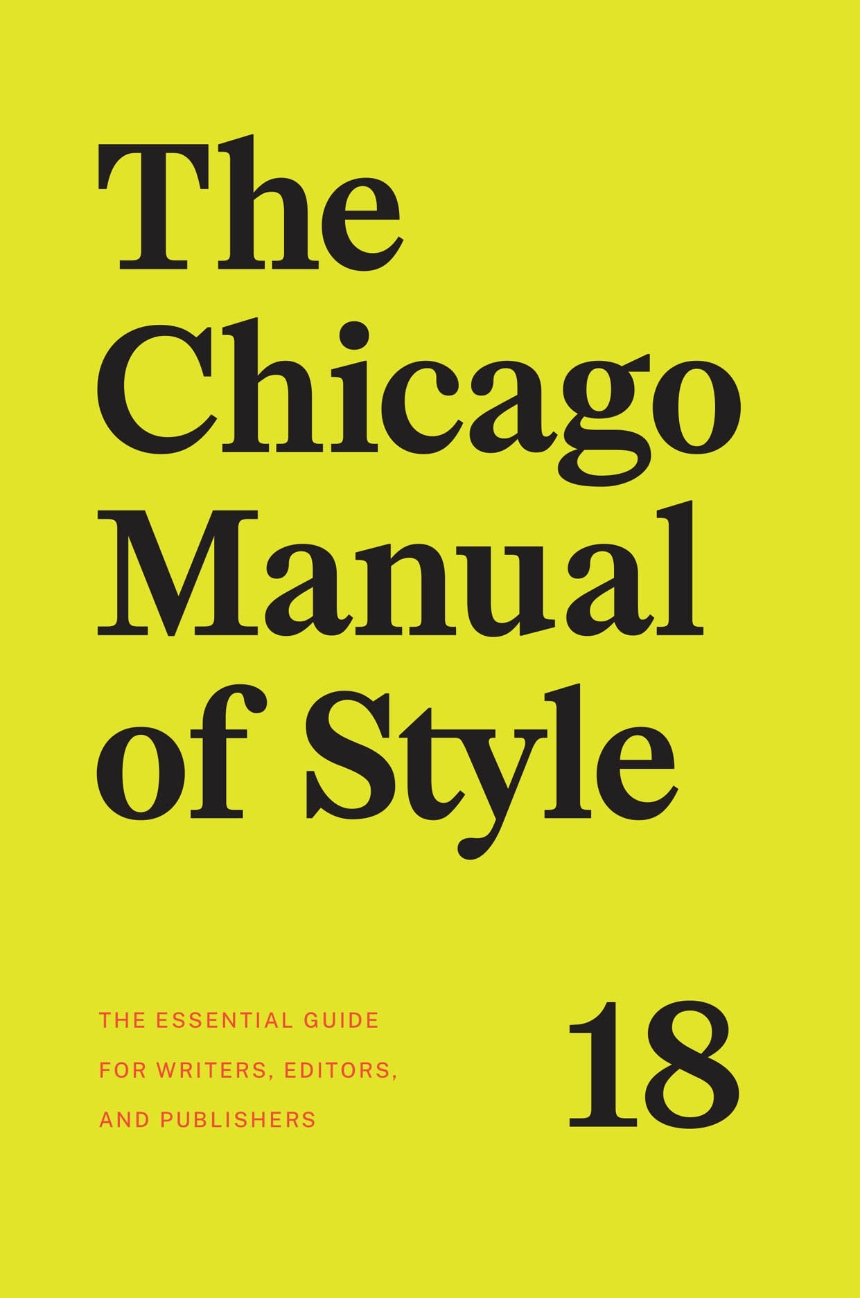
Chicago is a documentation style that has been published by the Chicago University Press since 1906. This citation style incorporates rules of grammar and punctuation common in American English. Chicago style allows for two types of source citation, Notes & Bibliography or Author-Date. Choosing between the two often depends on subject matter and the nature of sources cited, as each system is favored by different groups of scholars.
(Source: Official Chicago Manual website)
 The Chicago Manual of Style
by
The Chicago Manual of Style
by
Books
New in the 18th edition, place of publication is no longer required for book citations.
For book chapters, you do not need to cite the page range of the chapter in your bibliography or reference list but you should cite specific pages referenced in your note or in the text.
Articles
For articles with multiple authors follow these guidelines. If there are 3 or more authors, list only the first author in the notes or in the text, followed by et. al. List all authors up to six in the bibliography or reference list. If there are more than 6 authors, list only the first author in the notes or in the text, followed by et. al. and list the first 3 names in the bibliography or reference list, followed by et. al.
Cite specific pages as applicable in your note or in your text, but in the bibliography or reference list use the page range for the whole article.
Websites
It is often sufficient to describe a web page or web content in the text of your paper. Ex: According to an article published in people.com on August 27, 2024, Jason and Travis Kelce have signed a 100 million dollar deal to distribute their podcast, New Heights, via the Amazon Wondery platform.
If a more formal citation is needed, follow the examples below. If a date of publication or revision is not available, include a date of access.
The notes and bibliography style is preferred by many in literature, history, and the arts. This style presents bibliographic information in footnotes or endnotes, typically supplemented with a bibliography. If there is no bibliography the full citation should be given in the notes field. If there is a bibliography, information in the note can be brief but must match an entry in the bibliography. Brief notes typically include the author's last name, the title of the work (usually shortened if it's more than four words), and a page number if appropriate.
| Material Type |
Note Entry |
Bibliography Entry |
| Book or Ebook For an ebook a DOI or permalink would be added to the note w/o bib or full bibliography entry. |
Note w/o Bib.: 1. Michael Pollan, The Omnivore's Dilemma: A Natural History of Four Meals (Penguin, 2006), 99–100. Note w/ Bib.: 1. Pollan, Omnivore's Dilemma, 3. |
Pollan, Michael. The Omnivore's Dilemma: A Natural History of Four Meals. Penguin, 2006. |
|
An article in a journal |
Note w/o Bib: 1. Gueorgi Kossinets and Duncan J. Watts, “Origins of Homophily in an Evolving Social Network,” American Journal of Sociology 115 (2009): 411, doi:10.1086/599247. Note w/ Bib: 1. Kossinets and Watts, “Origins of Homophily,” 439. |
Bibliography: Kossinets, Gueorgi, and Duncan J. Watts. “Origins of Homophily in an Evolving Social Network.” American Journal of Sociology 115 (2009): 405–50. doi:10.1086/599247. |
|
A website
|
Note w/o Bib: 1.“Google Privacy Policy,” last modified March 11, 2009, http://www.google.com/intl/en/privacypolicy.html. Note w/ Bib: 1."Google Privacy Policy.” |
Bibliography: Google. “Google Privacy Policy.” Last modified March 11, 2009. http://www.google.com/intl/en/privacypolicy.html. |
The author-date style is preferred by those in the sciences and social sciences. In this system, sources are briefly cited in the text, usually in parentheses, by author’s last name and date of publication. The short citations are amplified in a list of references, where full bibliographic information is provided.
|
Author/Date Style |
In-text Citation |
Bibliography |
|
A book or ebook |
(Pollan 2006, 99–100) |
Pollan, Michael. 2006. The Omnivore’s Dilemma: A Natural History of Four Meals. Penguin. |
|
An article in a journal |
(Kossinets and Watts 2009, 411) |
Kossinets, Gueorgi, and Duncan J. Watts. 2009. “Origins of Homophily in an Evolving Social Network.” American Journal of Sociology 115:405–50. doi:10.1086/599247. |
|
A website |
(Google 2009) |
Google. 2009. “Google Privacy Policy.” Last modified March 11. http://www.google.com/intl/en/privacypolicy.html. |